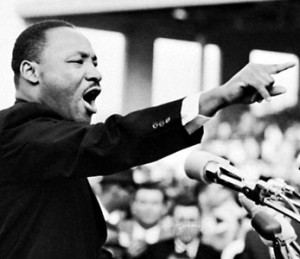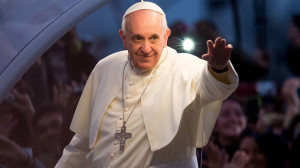We started this week with a quick report on the brave new world of legalized recreational marijuana here in Colorado. We are four weeks into a social experiment that will almost inevitably spread to other states and countries as they develop a post-modern political landscape, so…welcome to your future!
The main focus of the call, however, is on income inequality. On last week’s show Said Dawlabani, author of MEMEnomics: The Next Generation Economic System, made the case that America is moving into a new economic cycle that is more tuned to the post-modern (green altitude) values system.

If he had lived MLK might have kicked off the postmodern economic era in America.
I agree, and submit that evidence for this developmental move is the new emphasis from media and political leaders on the subject of the inequality of income and opportunity (social mobility) that has been emerging in America, particularly in the last three decades. Stories on this topic are popping up across the political spectrum and during this call I focus on two extensive news features that were broadcast this week: one from Fox news, and the other from MSNBC. I also look at two major policy speeches by top leaders from the left and right: President Obama on the left, and Florida Senator Marco Rubio (who is often cited as a future presidential candidate) on the right. Heck, even Rush Limbaugh weighed in, however (sigh) predictably.
“Just as the commandment ‘Thou shalt not kill’ sets a clear limit in order to safeguard the value of human life, today we also have to say ‘thou shalt not’ to an economy of exclusion and inequality.” ~Pope Francis in his Apostolic Exhortation
In various ways they all traced the issue of equality back through the last one hundred years of American history, outlining the same economic transitions that Dawlabani so vividly presents in MEMEnomics. They had different stories to tell, with different heroes and villains, but the thesis of the reports were remarkably similar: inequality is real, it is un-American, and it is threatening our social compact. The left focused more on inequality of income (dividing the pie) and the right focused more on inequality of opportunity (growing the pie). But the arguments taken as a whole have the feeling of an emerging integral understanding and agreement on at least the basic goal of leveling the playing field that has tilted dangerously in favor of our richer and better educated citizens.
Again, I argue that this marks the beginning of a new, more collective (green altitude) phase in the American economy. Of course, there is a long, hard road from speeches to actual legislated policy, but as Ken Wilber points out, “thoughts are things”, and it’s very encouraging to me that across the political spectrum leaders are thinking and talking about this crucial cultural issue.
The naive postmodern agenda is in a state of antithesis…now that it’s maturing there’s a new opportunity for at least some postmodernists to move into a more sympathetic position, a more integral position, where they appreciate modernism as the foundation of postmodernism as opposed to the enemy of it. ~Steve McIntosh
I am joined in the last half hour of the call by integral philosopher, Steve McIntosh, who you may know as the author of Integral Consciousness and Evolution’s Purpose, two must-read books for students of integral theory. What you may not know is that Steve is also co-founder (with Carter Phipps) of the Institute for Cultural Evolution, a start-up nonprofit think tank dedicated to the forward movement of the American political landscape. He makes the case that gnarly issues like income inequality as well as climate change can only be solved by an integral approach. I was most turned on by his insight that a new “synthesis platform” is likely to arise through a fruitful encounter of “optimistic post-modernists” from the left and “progressive libertarians” from the right, and that this synthesis is most easily identified in the Millennial generation. Hallelujah!
Podcast: Download
Subscribe: Google Podcasts | RSS







